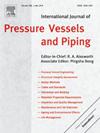受时空退化变化影响的地下油井可靠性评估和基于风险的完整性管理框架
IF 3
2区 工程技术
Q2 ENGINEERING, MECHANICAL
International Journal of Pressure Vessels and Piping
Pub Date : 2025-05-04
DOI:10.1016/j.ijpvp.2025.105537
引用次数: 0
摘要
油气地下油井油管完整性的逐渐丧失是由时间和空间变化的劣化机制造成的,例如在使用寿命期间的腐蚀和结垢。完整性管理的最佳规划应该考虑到与这些退化的时间和空间变异性相关的不确定性,以避免失败的灾难性后果。基于风险的方法以贝叶斯预后验决策分析和结构可靠性方法为基础,有可能为生产油管的检查和维修优化规划提供合理的依据。然而,目前,对于整个油管系统的检查和维护,还没有一个基于风险的整体框架。本文提出了一种基于整体风险的油气生产油管系统检查和维护优化框架。该框架的新颖之处在于考虑了生产油管作为一个系统的空间(和时间)可变性,该系统由不同损伤状态的几个部分组成,并且该框架是基于油管堵塞和渗漏两种严重的破坏模式,分别由水垢和点蚀引起。本文章由计算机程序翻译,如有差异,请以英文原文为准。
Framework for reliability assessment and risk-based integrity management of sub-surface well subject to temporal and spatial degradation variability
The progressive loss of integrity of oil and gas sub-surface well tubing results from temporal- and spatial-variant deterioration mechanisms e.g., corrosion and scaling during lifetime. An optimal planning of integrity management should account for the uncertainties associated with temporal and spatial variabilities of these degradations to avoid disastrous consequences of failure. Risk-based approaches taking basis in the Bayesian pre-posterior decision analysis and methods of structural reliability, have the potential to form a rational basis for optimal planning of inspections and maintenance of the production tubing. However, at present, an integral framework for risk-based planning of inspection and maintenance for the entire tubing system is not available. In this paper an outline of such a framework for an integral risk-based optimization of inspection and maintenance of oil and gas production tubing systems is developed. The novelty of the framework is the consideration of the spatial (and temporal) variability of production tubing as a system consisting of several sections in different damage condition states as time evolves, in addition the framework is formulated based on the two severe failure modes of the tubing clogging and leaking due to scale and pitting corrosion respectively.
求助全文
通过发布文献求助,成功后即可免费获取论文全文。
去求助
来源期刊
CiteScore
5.30
自引率
13.30%
发文量
208
审稿时长
17 months
期刊介绍:
Pressure vessel engineering technology is of importance in many branches of industry. This journal publishes the latest research results and related information on all its associated aspects, with particular emphasis on the structural integrity assessment, maintenance and life extension of pressurised process engineering plants.
The anticipated coverage of the International Journal of Pressure Vessels and Piping ranges from simple mass-produced pressure vessels to large custom-built vessels and tanks. Pressure vessels technology is a developing field, and contributions on the following topics will therefore be welcome:
• Pressure vessel engineering
• Structural integrity assessment
• Design methods
• Codes and standards
• Fabrication and welding
• Materials properties requirements
• Inspection and quality management
• Maintenance and life extension
• Ageing and environmental effects
• Life management
Of particular importance are papers covering aspects of significant practical application which could lead to major improvements in economy, reliability and useful life. While most accepted papers represent the results of original applied research, critical reviews of topical interest by world-leading experts will also appear from time to time.
International Journal of Pressure Vessels and Piping is indispensable reading for engineering professionals involved in the energy, petrochemicals, process plant, transport, aerospace and related industries; for manufacturers of pressure vessels and ancillary equipment; and for academics pursuing research in these areas.

 求助内容:
求助内容: 应助结果提醒方式:
应助结果提醒方式:


